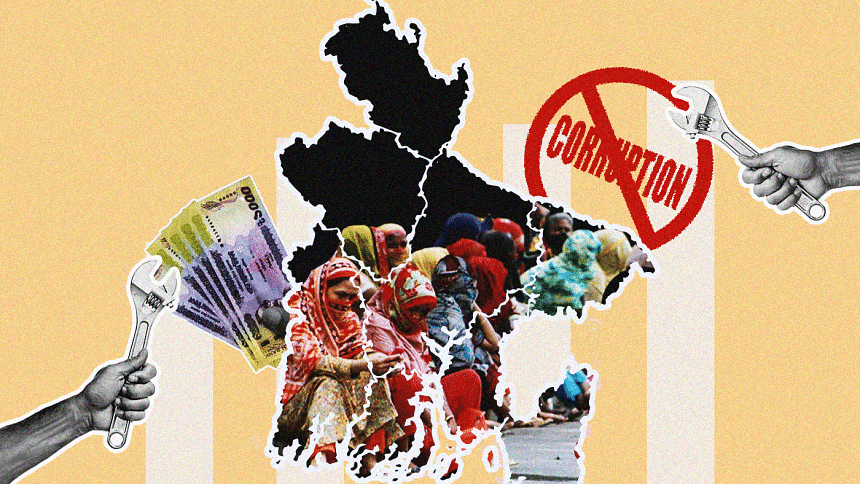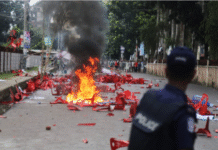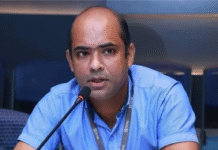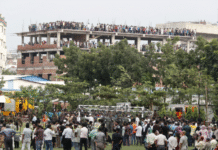
Geof Wood
On August 4, I submitted a piece to The Guardian in the UK under the heading “The Time Has Come.” In its final paragraph, I referred to Shakespeare’s Macbeth along the lines of “we are in blood stepped in so far that to return was as difficult as going o’er.” By August 5, events had already overtaken my final paragraph—so the piece was not published. A pity, as The Guardian has strangely not covered the political upheaval in Bangladesh very well or accurately. Strange, given, inter alia, the large Bangladeshi diaspora in the UK with contrasting political loyalties.
But clearly, this was a moment when the incremental autocracy over the previous 15 and a half years caught up with itself: the fear of retribution if power is lost stimulating further attempts at repression until the waters break. So many dictatorial regimes end in this way. The signs had been a long time coming. I recall presenting a paper to a conference in Dhaka back in 2016 asking whether there was only analytic room for Antonio Gramsci rather than Alexis de Tocqueville in Bangladesh, referring to the then regime as crypto-fascist. The argument of that paper was that the spreading of control over civil society (civil society for de Tocqueville being a prerequisite for democracy) resembled Gramsci’s notion of “political society,” where the independent permanence of institutions outside the state become incorporated into it. Following Gramsci, Douglass North and colleagues in Violence and Social Orders (2009) have seen independent permanence as a “doorstep” condition for the realisation of an open access, democratic society. Unfortunately, my pessimism was increasingly vindicated up to August 5. My more “below the radar” research across the last 15 years has focused upon the analysis of extreme poverty and, more recently, agrarian futures for the country, where there has been more traction with progressive policy thinking. Nevertheless, I was given the privilege of presenting a paper (at the CPD in January 2023) on the relative autonomy of the state from factional regimes to the country’s political scientists, and that argument right now has a different kind of traction!
Certainly, right now, for many devotees of Bangladesh and the interests of its people, there is more public space for critique. Back in June, The Daily Star published my review of René Holenstein’s My Golden Bengal: Views and Voices from Civil Society, where many familiar activists, commentators and academics had been interviewed and where they conveyed an overall sense of betrayal of the optimism of liberation through the subsequent practices of contaminated democracy and governance. In that volume, words were chosen carefully and cautiously, and at the book launch as well, but now the “time has come” for a more open regret as a basis for the restoration of liberation principles. That path of restoration has for the moment been entrusted with the interim government.
We have been here before in Bangladesh: the caretaker government in early 1990, and the caretaker government of 2007-08. Both, though under different circumstances, were periods of technocratic management, with the bureaucracy and civil society in the forefront rather than the army or politicians representing parties, and both were trying to repair the state and make it fit for purpose for another round of competitive politics and regimes. It was a hard ask then, and it remains so again now. There is much to fix, buried deep within the political economy and culture, where much negativity has been allowed to flourish. Many will have their own list of priorities, but in a spirit of affection and loyalty to the citizens, I offer mine, which I see from reading this daily from a distance resonates with other opinions too.
First, while the evolution of the Awami League can be explained, though not excused, in dynastic terms, there have been other political players in the country with claims on a secular, inclusive narrative of liberation with religions and cultures pursued within the society in a spirit of mutual tolerance. These others have emerged from time to time, e.g., the Gono Forum, to challenge the self-serving Awami League monopoly of the inclusive narrative. In a sense, this inclusivity is the benchmark against which all future political contenders for office should be judged and encouraged. Perhaps this requires a truly independent Election Commission, representing the civil society, to interpret a constitutional “eligibility to contend” based on such inclusive principles which were so hard won across the 1950s and 1960s, early 1970s, and again in July-August 2024.
Second, the development story of the country needs more authenticity and balance. The transformation of Bangladesh over the last 50 years of my witness (I first arrived in Cumilla with my wife in August 1974) has been truly amazing—good in parts but also problematic. There needs to be a re-examination of the data bases used for claims and judgements. Has poverty really been reduced to the levels claimed? I doubt it. Not least because the economic thresholds used for measurement seem to be hopelessly unrealistic as a definition both of not being poor (though highly vulnerable) and of being “middle class.” This was raised by one of the present advisers of the interim government in the presence of the then planning minister in a 2018 launch event of the book Aiding Resilience among the Extreme Poor in Bangladesh. These vulnerable and the “middle” classes were deemed not in need of support and swept up in the “leave no one behind” assumptions of economic growth, even though a minor uplift in income thresholds brings millions of the vulnerable into poverty—as was revealed in the analyses of Covid by the BRAC Institute of Governance and Development (BIGD) and Power and Participation Research Centre (PPRC), for example. Earlier projections by Dr SM Zulfiqar Ali at the Bangladesh Institute of Development Studies (BIDS) indicated the same.
However, a multidimensional understanding of poverty and well-being indicates that incomes, expenditure and assets are unconvincing as a sole guide to well-being outcomes, even if thresholds are uplifted. And this is even more so in the throes and aftermath of significant inflation, especially on essential commodities. It would be interesting if Bangladesh could imitate Bhutan in the pursuit of happiness and well-being indicators to measure its inclusive success.
Third, strongly linked to the above is inequality. Bangladesh appears to be among the most unequalising societies in the lower middle-income country (LMIC) group. There is a consensus among individual and institutional observers that the economic gains of the country’s rapid transformation over the last 50 years have been largely captured by narrow elites, both legally by capitalism and of course illegally through rent-seeking. The interim government is beginning to deal with this illegal capture, but it will be even more challenging to address the underlying structural issues that reproduce inequality.
This brings me to a little obsession of mine about language and discourse. The global aid powerholders have coined the expression “leave no one behind” as the key principle of the Sustainable Development Goals (SDGs). This is solipsistic. A trap for the unaware. A neo-liberal formula for trying to make everyone better off at their level in society, without scaring the horses, without pain for the rich and better-off who have benefited from decades of rent-seeking. The interim government should not be fooled by this and should leave a clear legacy to any successors that inequality is a function of entitlements and access to opportunities, structured subtly by class preconditions, cultural labelling, adverse incorporation and social exclusion. These social forces have to be deliberately confronted based on an acceptance across the whole society that redistribution of opportunities and outcomes has to be affirmatively actioned. “Sharing the well,” in other words.
And it starts with children and youth—their access to quality education, the underpinning of future public goods. The students are right. But how? Attacking corruption is one thing. But progressive income and wealth taxation is structurally key to any inclusive economic restoration. The interim government could put in train irreversible tax policies to this effect, which no subsequent government needing popular support could possibly dismantle. Just consider the fortunes made in Dhaka real estate, derived from fortuitous receipt of plot allocations by successive regimes across favoured state and business communities. At present, tax rates in Bangladesh are so unsustainably low as a proportion of GDP that no government can make a difference to inclusiveness.
Fourth, of course, corruption and rent-seeking have been pervasive. The state and upper echelons of the society have conspired in kleptocracy. From the media, I can see that examples are being made through arrests, charges and freezing of banked assets. Loan defaulting has also been pervasive with culprits running free across Dhaka as well as investing in places like Dubai and the UK. But perhaps there should be carrots as well as sticks. There is no point in making examples of offenders unless those examples engender behavioural change. Perhaps, initially, the interim government should pursue some version of the Laffer curve, where under the threat of what could happen to them through the courts, offenders are incentivised to accept a fairer tax on assessed gains in return for immunity alongside zero tolerance for re-offending. In other words, a deliberate pursuit of restitutive economic justice which sets the path for future revenue-based inclusive investment in basic services as well as contribution to present cleansing. After all, no government, however well- intentioned, and starting from this present legacy, can lock up half the society!
Of course, there is so much more to fix in terms of stabilising the macroeconomy and subduing inflation, diversifying the economy from overreliance on the RMG sector, managing geopolitical vulnerability, defending minorities, protecting women, upskilling to reduce reliance upon overseas managers and engineers, understanding agrarian futures in the context of climate change, and so on. But there is no more space in this piece. For now, I have emphasised: eligibility to contend for power democratically; a more authentic and balanced understanding of development as a platform for policy priorities; stronger attention to well-being and happiness notions of progress and inclusivity; and “sharing the well” and restitutive economic justice to address inequality and rent-seeking, reinforced by wider income and wealth taxation. All of these occur within a desire, an inherent Bangalee desire, for justice and fairness which has other dimensions not addressed here.
So, I end here, for now, with a strategic principle for the interim government. It needs to set in place irreversible principles and practices that constrain arbitrary power in the future leading to the misuse of popular consent. This requires the organisation and management of equity as the basis of justice and fairness, i.e., a reform of the justice system itself. Part of that irreversibility is the freedom of citizens to critique state practice and hold institutions and individuals to account as a precondition of good governance, while bearing down on the destructive freedoms of hate, othering and exclusion, always remembering that social capital can have this dark side too. All of the above takes time to entrench. Given 15-plus years of democratic decline, I would think the society could tolerate a year or two for a restoration of the underlying principles of inclusive democracy. A rush for elections without such restoration might just repeat the cycle that Holenstein’s interlocutors were so depressed about.
Daily Star









